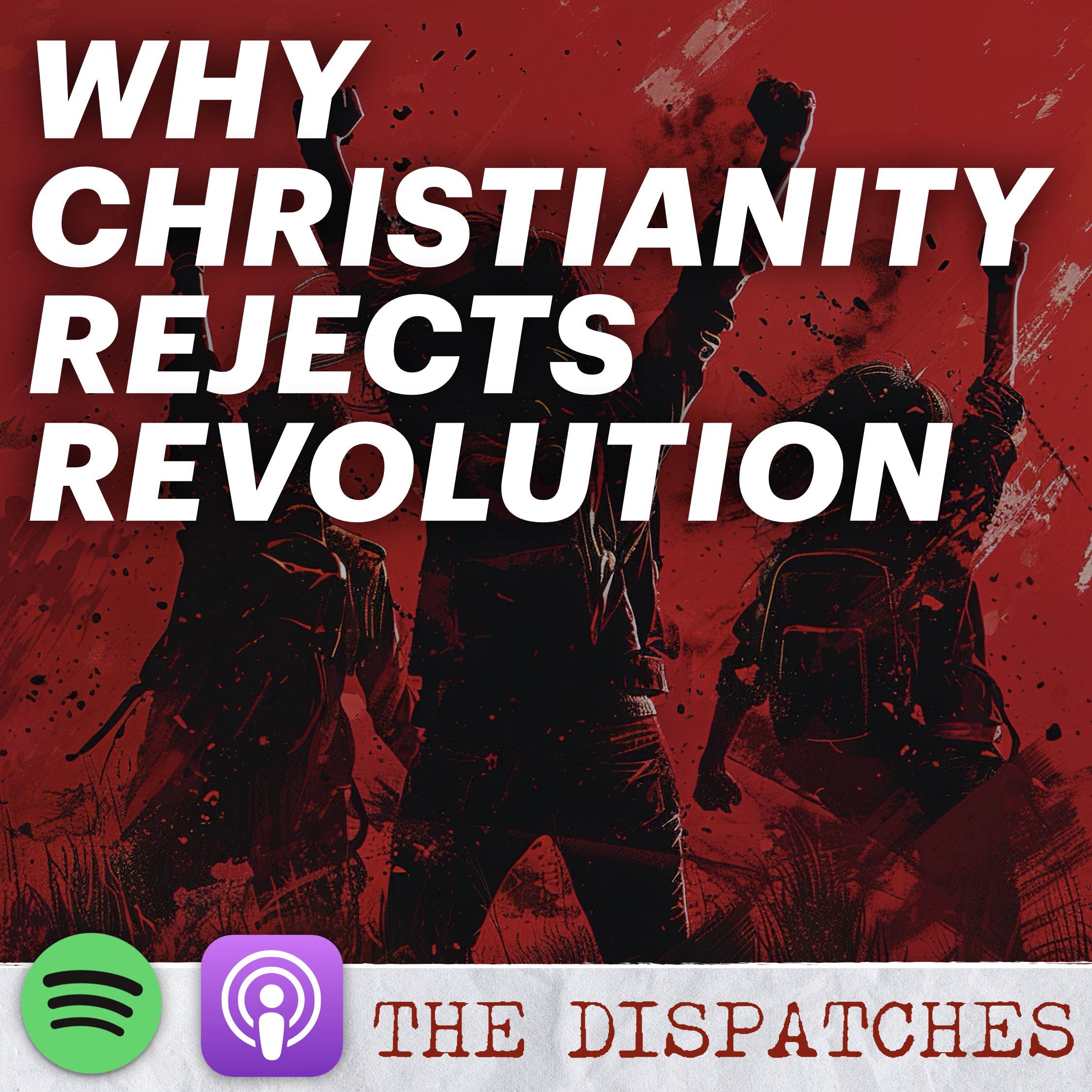[00:00:04] Hi, my name is Brendan Malone, and you're listening to the dispatches, the podcast that strives to cut through all the noise in order to challenge the popular narratives of the day with some good old fashioned contrarian thinking. You might not always agree, but at least you'll be taking a deeper look at the world around you.
[00:00:22] Hi everybody. Welcome along to the Friday Freebie edition of the Dispatches podcast. My name is Brendan Malone. It is great to be back with you again. And today's topic of conversation is why it matters that christians are called to mission and not revolution. Before I get into that, though, just two very quick things. Number one, please forgive the audio quality today. I am away speaking in Australia at the moment, and so I am recording this on my portable kit, which means it's not quite up to the same usual high standards. Secondly, if you're not already a patron of leftfoot media, please go to patreon.com leftfootmedia and become a patron. And if you do that with $5 or more perennial month, you will get a daily episode of the Dispatches podcast. That's right, an episode of the Dispatches every single day of the week, Monday through Friday. So that's patreon.com leftfootmedia. The link is in today's show notes and a huge thank you to all of our patrons. It's thanks to you that today's episode is made possible. Alrighty. Let's get into it then. Why it matters that christians are called to mission and not revolution. Let's start with an important event that happened in the life of Christ. And it's something that if you go to church on Good Friday, you will hear every good Friday in the passion account, the final hours of Christ's life, that is read out from the gospels on Good Friday. And it is the moment where Pilate, who's desperate to get Jesus off the books, he just does not want anything to do with this man. And he's basically a quintessential moral coward. At one point, he realizes there is a local tradition where the crowd can choose to free a prisoner and he can let someone go. And he thinks, this could be my opportunity. What I'll do is I will bring out a guy called Barabbas and I'll put him alongside Jesus, and then I'll let the crowd decide who should be freed. And the crowd, of course, is ginned up by the religious leaders who hate Christ. And so the whole thing is rigged. And in the first recorded incident of a referendum, a democratic vote in the ancient world, we have the serious failures of democracy exposed, for one and all, to see, because the crowd chooses the criminal Barabbas instead of the totally pure, totally innocent Jesus, the son of God. Now, when I heard about this incident as a boy and through most of my adult life, I just thought this was yet another injustice that was perpetrated against Christ in a litany of injustices that were leading up to the ultimate injustice and indignity, which was his crucifixion on Calvary. But in actual fact, it's so much more than that. It's not simply the totally innocent one who is abandoned and the crowd chooses instead the guilty criminal over the innocent Christ. It's so much more than that, because Barabbas is actually quite important in all of this. And if we understand who barabbas is, we can start to see there's something deeper and more important that the gospels are trying to tell us here. So, first of all, Barabbas, we know, is a notorious prisoner. And we know that he is a political revolutionary. And by all accounts, he actually seems to be the leader of a political revolutionary movement. And his name in this case, is vitally important. The name Barabbas means son of the father. It was quite typical of the jewish zealots, the political revolutionaries, to give themselves these kinds of names. In fact, in the final jewish uprising and revolt that was quashed brutally by the Romans about, was it 100, 3132 AD, if I remember my history correctly. And that particular revolution was led by named Simon Bar Kokhbar, which means Simon, son of the stars. So this was quite a common thing to do. But in this case, Barabbas has quite a specific name, and his name means son of the Father. And that's quite important here, because what's actually going on now, you realize, is that here's a man who is a type of antichrist standing beside the real Christ. And this antichrist is claiming to be the real son of the father. He's called himself the son of the father, but we know that he's not, because Christ is actually the real son of the father. He tells us this himself. So what's actually going on here is you have the crowd being asked to choose between the real Christ and a type of antichrist. And what's important to note in all of this is the difference, the big distinction, between the two barabbas. The antichrist, is also promising the crowd salvation, just like Christ is offering them salvation. But there's a big difference. Barabbas is promising them their salvation through politics, through political revolution. And uprising through tearing down that which is so political. Revolution is the promise of salvation that he offers them, but Christ doesn't. Christ calls the crowd to something completely different. He calls them to a total abandonment of self. He calls them to be salt and light. He calls them to go on a mission, a mission of self giving love, of mercy and compassion, of being salt and light, which seasons the culture, which transforms the culture, which burns brightly for the truth and beckons people, but doesn't kick the door and tear things down and drag people away kicking and screaming.
[00:05:47] Big power play that's actually going on in this incident between Jesus and Barabbas on Good Friday. And can I humbly suggest to you that I think that that same power play is being played out in our culture right now. We are now living in a world which effectively, as some have, I think rightly described it, become a political cult. And everything is now political. I won't go into the reasons for that, but basically it stems back to Karl Marx, and everything has become political. Everything is about politics. Everything's about who's got power, who doesn't have power, and we constantly hear people talking about revolution, about tearing down, about old orders and new orders, et cetera, et cetera. Everything is about a grasp for power. It's about politics. This is the struggle between Jesus and Barabbas, played out of over and over and over again. And can I say, I think this is important. Just on a little side note, I know sometimes, and I've done this myself, I've talked about a christian revolution, which is needed in the past. I don't tend to use that word anymore, because words do matter. And I've come to realize that that's not really the correct way to describe the christian calling and what it is that Christianity actually does in a culture. Just consider the words of Christ himself. He explicitly states, I have not come to destroy, to overthrow the law. I have come to fulfill it. I have come to take things to a higher level. And that's quite different from a revolution, because a revolution is something that is about tearing down, that is about destroying. The christian mission is not. And so I thought it was important to talk about this today, because if you're listening and you're tuning in and you're someone who's a person of faith, then if you follow Christ, if you're a disciple of Christ, then you are called to that mission, not to revolution. So it's important to understand, I think, some of the distinctions here. So what are some of these important distinctions between revolution, and mission? Very good question. I'm glad you asked. Let's explore it right now. First of all, revolution is reactive, while mission is proactive. If you could sum up revolution, I think you would say that it is this frenzy. It is marked by imprudence. It is marked by rage. It is not uncommon in a revolution. When you think of revolutions, what do you think of generally? You tend to think of angry, frenzied, outraged and destructive mobs. It is very reactive. Revolution identifies itself according to that which it fights against, whereas mission is not like that. Mission is proactive. Mission is about discernment and about discerning things. It's about peace. It is about trying to build something. It's about having a sense of certainty of who you are and where you are going. That's what a mission actually gives you. It gives you clarity. A mission doesn't exist in reaction to something else. I mean, it can do. But what even within that, when it does, a mission is something that has its own clear sense of proactive purpose and direction. I recently heard an interview with a young new atheist, one of the last of that dying cult, who was still desperately clinging in there. And he was asked about this, you know, the new atheist, Dawkins and Harris and company. You turned up, you tore everything down, but you didn't offer the people anything in return. And he just glibly replied, and he was quite serious about it as well. Well, that wasn't our job. Our job was just to tear it all down. It wasn't to tell people what to do next. And that is a very typical hallmark of a revolution. Frenzy, imprudence, rage, no consideration for what actually comes next, because it is purely reactive. It's reacting to something. There's an old african proverb that says if you come across a fence in the jungle and you don't know why the fence is there, then you better not tear it down. And I think that's often what we see a lot of in our culture today. A lot of tearing down, but not a lot of discernment and certainly not a lot of peace about what's going on. Secondly, revolution is destructive, whereas mission is restorative. Revolution, I think, is consistently marked by a sense of despair. It's this abject sense of abandonment and loss, and there is no other way. So I will take matters into my own hands again, building on that reactivity, and I will tear things down. I will fight. As the marxist revolutionaries are famous for living by the creed, if you like. Or one of them is this idea that if you want to make an omelet, you got to break a few eggs. So anything goes. It's very utilitarian, it's very consequentialist. The end justifies the means. Anything goes. To achieve the revolutionary aims and the revolutionary outcomes, and to tear down and destroy the old order. Revolution is destructive. Mission is restorative, because mission instead is actually built on hope. It is about a willingness to do what needs to be done while leaving the bigger picture up to God. And I think that's a big difference between a revolutionary and a missionary. A revolutionary feels that they have to do it all themselves, because it's all about building some earthly political structure. It's all about tearing down the old order and rebuilding a new one in your own image. And so it becomes this obsession, and that's why the end justifies the means. You've got to achieve it. You've got to do it.
[00:11:29] You know, there is no other way effectively. Whereas someone who's on a mission, a missionary, they act and they try and do things like address injustice and bring light into dark places, but they come from a place of hope, not a place of despair. They have a sacred, transcendent horizon. They look to something higher and bigger and divine, and so that fuels their hope. And even in the face of great moments of injustice and great moments of hardship and darkness, they still persist in doing what needs to be done. And they also have the ability to leave the bigger picture up to God. They're not tempted to make it all about themselves and their own political ambitions. That's a hallmark of missionary work. It's about being salt and light. That's the gospel command from Jesus. Go into the culture and be salt and be light. Salt doesn't destroy that which it seasons. Instead, salt is a preservative. It preserves and brings flourishing to the things that it seasons. So if you put salt on your meat, it actually brings out the flavour. It adds flavour. It preserves. It doesn't destroy and tear down. It's not like pouring acid all over something. That's what revolution is like, is like acid being poured all over something. Light doesn't destroy what it brightens. Instead, it allows our vision to flourish. It opens up even more possibilities. Think of someone stumbling around in a dark cave or a very dark, big, cavernous room. But if you give them light, then all of a sudden more possibilities are opened up for them. They can actually inhabit that space. If you are able to light up that space, you can live in it effectively. You can create little spaces around that massive, giant room that was previously inaccessible to you. So light doesn't destroy what it brightens. It allows our vision to flourish, it allows our horizon to expand. And that's a big and very important difference between mission and revolution. Another one is that revolution is ultimately about revenge, whereas mission is about redemption. Revolution tends to be self aggrandizing and arrogant. It's about a list of people that have wronged you, that have harmed you and must be harmed, destroyed, torn down in return. It is very self aggrandizing and arrogant. And you consistently see that in political revolution, what you consistently see is a lack of integrity. The revolutionaries are consistently hypocrites. Even if they might identify an authentic injustice, their response to the injustice is wrong. It's the revolution, the destruction, the violence is the thing that is wrong. Their reaction is where the problem lies. And what you consistently see is the moral compass is now gone. And it's all about the individual revolution revolutionary leader and their vision, their self aggrandizement, their view of the world. And what you commonly see is an actual fact that revolutionary leaders very quickly fall off the wagon and become the very thing that they have attacked. If you look at the marxist revolutions, what you consistently see, it's fascinating reading the biography, for example, of the life of Stalin and those early marxist revolutionaries. And when they start the revolution, there is like a genuine commune type atmosphere that's going on between the families when they move into that famous apartment block together and they have this communal life, and they come and go, and there's a shared sense of something going on. But as you read the history of these people in their biographies, very quickly that dissipates, and all of a sudden they have power and wealth and the doors are closed, and next thing you know, they've got big mansions and big homes and summer homes, and the whole thing is a complete unravelling of what they claim to be.
[00:15:21] They become the thing that they set out to destroy. Whereas mission is about redemption. Because mission, christian mission, is transcendent. It looks beyond itself for the answer. It's not about me, the revolutionary, who must win this thing, who must provide the plan, who must provide the answer. Instead, I look to a sacred, transcendent horizon. I look above and beyond myself to God. And so what that means is that I look with a sense of redemption. How can I be salt? How can I be light? How can I elevate and help this culture around me to flourish? How can I help my neighbour to flourish? And there is something transcendent. There is a looking beyond. And that makes a huge difference. It's about redeeming that which is where you see injustice. You seek to bring goodness, truth and beauty. You seek to redeem that which is broken. And those whom are broken by a broken system or a broken politic or a broken culture. Another important distinction is this, and this is really a big one, is that revolution is about hatred, whereas mission is about love. Revolution is about hatred of something, a political order, a person, a class, a group or different identity, groups of people. It's about hatred and acting out of that hatred for those people, for that system, for that culture, for that class, whatever it might be, which draws the ire of your hatred, the thing which, you know, you blaze like the eye of Sauron against. Whereas mission is about love. It's about love for God, love for neighbour, love for goodness and truth. And that is a huge difference. The missionary is driven by love, not by hatred. The missionary is driven by hope, not by despair. The missionary is driven by God and his commandments, not their own ego and their own self aggrandizing political schemes. And when you think about it, the political revolution of Barabbas was ultimately a complete failure and is all but lost to history. In fact, the only reason that we know the name of Barabbas is because of the mission of Christ. So the only reason we know of the revolutionary Barabbas is because of the first and most important missionary, Christ, who comes to show us the way, who is the way itself, who is life, who is truth. Barabbas only exists in relation to that which he hates and that which he tears down. Without something to tear down, a revolution cannot exist. But mission can and should always exist. And it's through us that it can and should always exist. Just as dark is an absence, an absence of light, so revolution is also a type of privation, an absence. It is a disordering of the goods. Revolution might see a legitimate injustice, but then the response is where the goods are disordered and it becomes anything goes. It is an absence of light. If you like, it might be a good way to think about revolution. Ultimately, it seeks change, but without love. And that is its ultimate privation. The ultimate absence in revolution is the lack of genuineness, genuine, authentic, self giving love. It's the crowd being invited again to choose. Do you choose Barabbas power, revolution, political overthrow? Or do you choose Christ, the mission of self giving love, to be a beacon, not a cudgel or a stick that beats people into submission, but a beacon that calls and invites people. So what is that christian mission when we're called to be salt and light? Well, first of all, I think for all of its promises, the enlightenment has ultimately failed. Anything good which you see in and which we have received from the Enlightenment has come directly from Christianity. It stole directly from the tree of Christianity. It thought it could keep all of the good fruits that grow on the tree of Christianity but reject the tree. And then eventually what happens is you have future liberals who come along and say, not only can we forget the tree, but let's take an axe to the roots of the tree and try and tear the whole thing down. The Enlightenment project, I would suggest to you, has all but failed. It has left people in a great state of existential crisis. It has left people with a lot of wonderful technology but no moral restraint. It has left people with amazing devices in their hands, but a lack of community, a lack of meaning, a lack of sense of purpose. There is no sumenbonen, there is no greater good which people serve. There's no sense of why am I doing this? What is the deeper purpose in all of this? Why do I go to work? Well, I go to work to make money, sure, but why are you doing that? What's the thing that truly motivates and puts you on this mission? Do you even have a mission? And I think most people probably don't even feel that sense of mission in their lives in the west anymore. Enlightenment liberalism promised a West that would be unshackled from the supposed darkness of religious superstition, which it obviously never was. That was their myth. But that was the promise. It would unshackle us from the darkness of religious superstition, bring about a bigger, brighter and better world, a more advanced society, a more caring, a more rational and a more enlightened humanity. But in reality, in actual fact, what it's really done is rob humanity of a sacred, transcendent horizon. And instead of looking up and beyond, we now think that stubbornly refusing to raise our eyes to the heavens in search of meaning and hope makes us stronger and better and more intelligent than those, those insane, superstitious and unintelligent, unenlightened people who still do such things. Not like us. We're the ones scratching about in the mud with our eyes down. We don't need to look up. We shouldn't look up. We're rational creatures, don't you know, not silly, superstitious ones. In reality, though, we are like poor wretches, our eyes lowered, flailing around in the muddy while something grand and glorious is right there waiting. If only we would just overcome our own stubbornness and pride and just look up and look beyond and look to that sacred, transcendent horizon and look to God. Now, the christian mission is, I think, when we talk about being salt and light, to live a life of sacred salt and light, to live authentic goodness, truth and beauty, it is to be a beacon which awakens a sense of sacred, transcendent wonder in people. A life that speaks of heavenly riches to human beings crushed by the burden of existential poverty. A life of christian goodness, truth and beauty. Of course, all goodness, truth and beauty is authentically christian because we know that goodness, truth and beauty aren't simply attributes of God. God is goodness. God is truth, God is beauty. So when we live those things, we are profoundly encountering and with God in some profound and mysterious and quite beautiful kind of way. But if we live that authentically faithful christian mission of self giving love, then we will become these beacons of sacred wonder, these beacons which awaken and reawaken a sense of wonder within a dulled and technologically numb culture. A people stumbling around in the mud, fighting for their little patch of earth, not realizing that if only they just looked up something more beautiful, heavenly riches, the pearl of great price would be waiting there, right? Therefore, we need to be like those people who pull those pranks. But ours is not a prank, of course, where they go into the middle of a city and they stand and look up and they start pointing upwards and then everyone suddenly joins in because they are drawn and captivated by what's going on. They're not sure. They start looking up themselves and looking beyond. We need to be that kind of a beacon. Our upward gaze should result down here in a enlightened. A sense of salt seasoning something, a sense of hope, a sense of light, a beacon which calls people see, smell and taste in us. Something different which draws their gaze upwards. That is the christian mission and that is exactly what our culture needs today more than ever before. The cure for a political cult, for breaking people free from the shackles of a political cult, is not christian politics. It is not more politics. It is christian relationship, it is authentic, self giving love. It is christian mission. It is to have people reawakened with a sense of sacred transcendence, wonder, to have people realise that they can look up. And when they look up and beyond for their answers, all of a sudden they find that they have broken free from the dark and lowly political cult that holds them prisoner. Thanks for tuning in. Don't forget, live by goodness, truth and beauty, not by lies. And I'll see you next time on the dispatches.
[00:24:46] The Dispatchers podcast is a production of Leftfoot Media. If you enjoyed this show, then please help us to ensure that more of this great content keeps getting made by becoming a patron of our
[email protected].
[00:24:58] leftfootMedia link in the show notes thanks for listening. See you next time on the dispatches.






